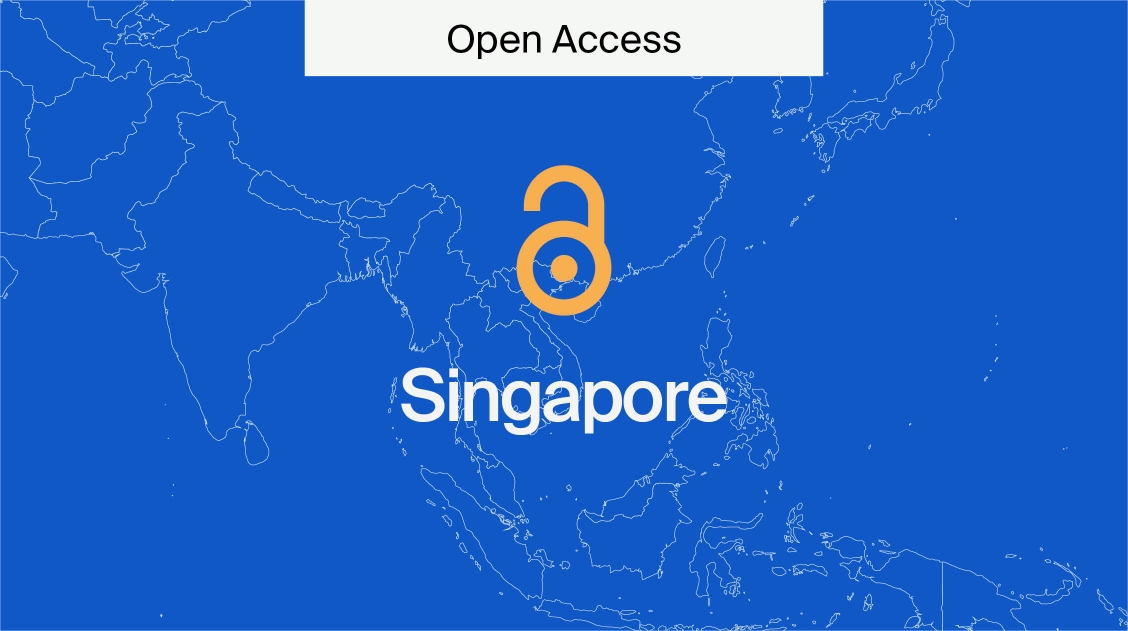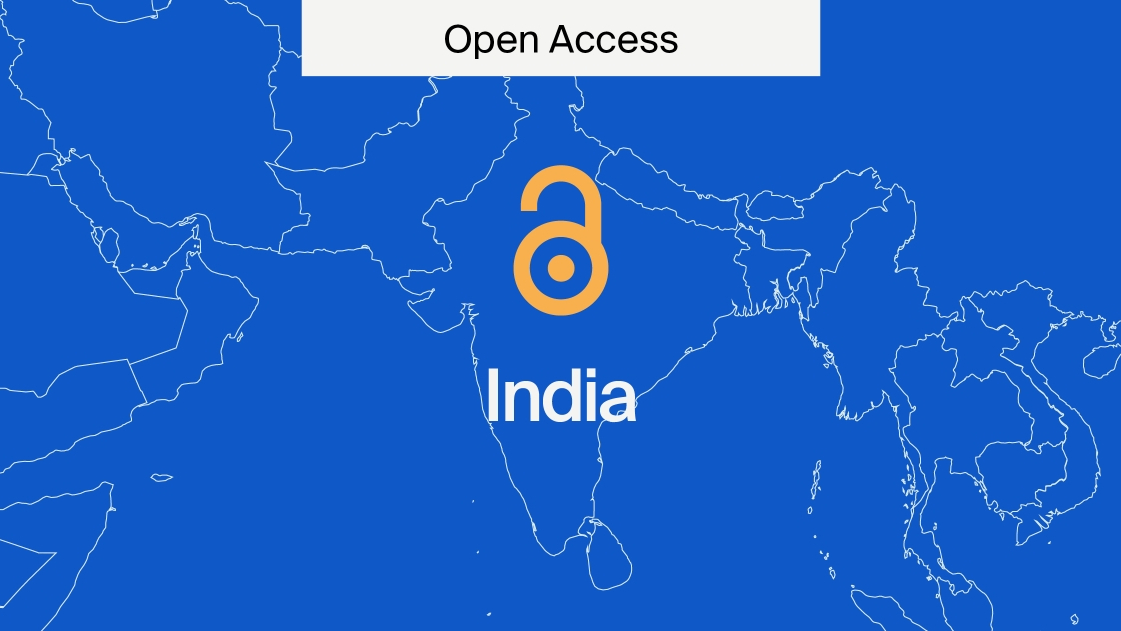
Open Access in Singapore
Singapore has a robust university infrastructure that is dedicated to hosting open repositories for both articles and data. Several of the country’s leading funding agencies also require publications be made Open Access within 12 months.
We outline the history of Singapore’s Open Access mandates and current policies for those looking to submit research or read it.
Open Access is the new paradigm
Open Access refers to a publishing model for scholarly research that makes information immediately available to readers at no cost. This research is also often free to reuse for scholarly purposes.
The benefits of publishing Open Access include gaining more citations, which can lead to a greater impact, reaching a wider audience, advancing scientific innovation, retaining copyrights, and increasing the potential for collaboration and recognition.
Open Access can also help institutions like universities and research agencies in low- and middle-income countries by removing any price barriers to academic research.
History of Open Access in Singapore
Universities in Singapore have been participating in Open Access for two decades. Here is a brief history of Open Access in Singapore:
- 2005: The National Institute of Education (NIE) launch their institutional repository.
- 2009: The National University of Singapore (NUS) launch their institutional repository, ScholarBank@NUS.
- 2009: The Nanyang Technological University (NTU) launch their institutional repository, DR-NTU.
- 2010: The Singapore Management University (SMU) launch their institutional repository, InK@SMU.
- 2011: NTU introduce an Open Access policy, requiring the depositing of final manuscripts in DR-NTU.
- 2013: The Agency for Science, Technology, and Research (A*STAR), a national funder, introduce an Open Access mandate and create their own A*STAR OA Repository (A*OAR) to encourage compliance.
- 2014: The National Research Foundation, a national funder, introduce a policy requiring research-performing institutions to have Open Access policies.
- 2015: The National Medical Research Council (NMRC), a national funder, require Open Access for funded publications.
- 2021: The national open data repository data.gov is launched.
- 2024: For Open Access Week 2024, MDPI Singapore host celebrations at the Marina Bay Sands Convention Centre.
Singapore’s infrastructure works to encourage green Open Access, via repositories, and is building a strong culture around openness to help ensure publications are accessible.
Several leading universities are engaging with Open Access and the major funding agencies have requirements.
Current Open Access laws in Singapore
There is no national Open Access mandate in Singapore. However, leading funding bodies have them.
From 2016, the National Research Foundation (NRF), Agency of Science, Technology, and Research (A*STAR), and National Medical Research Council (NMRC) have requirements that publications arising from funded research be made Open Access no later than 12 months after publication. They allow the use of research grants to pay article processing charges (APCs).
Furthermore, there is investment in national infrastructure, such as in Singapore’s open data portal, data.gov. This contains over 5000 datasets from over 70 government agencies and allows users to access and reuse data for commercial or personal use.
Singapore university-level open infrastructure
There are a range of university policies and repositories available for researchers based in Singapore. Repositories are centralised digital platforms that host manuscripts or data, ensuring they are easily accessible via search engines and the platform itself.
These extend into open science practices, such as data and data management plans.
From 2005, institutional repositories started emerging. Yeo Pin Pin, Head of Research Services, Singapore Management University Libraries, explains
The library staff of the [institutional repositories] in Singapore focus on supporting institutional policies, integration with internal systems, building content and promoting usage and engagement within the community.
Large repositories include:
- National Institute of Education Digital Repository.
- Nanyang Technological University DR-NTU.
- National University of Singapore ScholarBank@NUS.
- Singapore Institute of Technology IRR.
- Singapore Management University InK@SMU.
Open science requirements at Singapore universities
The universities are also implementing Open Access policies for their faculty to varying degrees, with many introducing open data requirements.
For example, all NTU faculty, staff, researchers, graduate students, and undergraduates must deposit their final peer-reviewed manuscripts to DR-NTU upon acceptance of their publications.
Furthermore, in 2016, NTU introduced a requirement that researchers submit a data management plan using the NTU template at the beginning of their projects. This must record the intention of how research data arising from the research project will be managed, used, and shared.
After the project, the final research data must be deposited in the NTU Data Repository or an external Open Access data repository.
Singapore Statement on Research Integrity
Singapore is a hub for research and has invested heavily into Open Access and open science infrastructure. This made Singapore the ideal location for the 2nd World Conference on Research Integrity.
This event led to the Singapore Statement on Research Integrity, which represents the first international effort to encourage developing unified policies, guidelines, and codes of conduct around fostering greater research integrity.
The statement was a collective effort, featuring contributions from 340 individuals from 51 countries, and is a global-facing guide to the responsible conduct of research.
The statement itself has four key principles:
- Honesty in all aspects of research.
- Accountability in the conduct of research.
- Professional courtesy and fairness in working with others.
- Good stewardship of research on behalf of others.
These are followed by 14 responsibilities, which overlap with open science principles. For example:
- Adhere to regulations and policies relating to research.
- Ensure there are clear, accurate records of all research in ways that will allow verification and replication of their work by others.
- Share data and findings openly and promptly, as soon as suitable.
- Recognize the ethical obligation to weigh societal benefits against any risks inherent in work.
Singapore Open Access statistics
Singapore has steadily increased its share of Open Access publication. According to InCites data (Clarivate) extracted in April 2025:
- 2013: 68% of articles and reviews were subscription-only and 32% were Open Access.
- 2018: 54% of articles and reviews were subscription-only and 46% were Open Access.
- 2023: 46% of articles and reviews were subscription-only and 54% were Open Access.
As you can see, the percentage of Open Access publications has surpassed subscription-only, increasing at a steady rate from 2013 onwards. This highlights that, even without a national mandate, Open Access is flourishing in Singapore.
Future trends
Open Access in Singapore is centred around the major funding bodies and university infrastructure.
The above data indicate that Open Access is growing steadily without a national mandate, and the government is invested in open infrastructure, as shown by data.gov.
Leading universities are expanding their requirements into broader open science principles, including open data and data management plans.
Therefore, there is a solid infrastructure for green Open Access and support for publishing gold from the funding bodies. It is likely that this will continue as the culture of openness continues to strengthen in Singapore.
Value of Open Access
All articles published by MDPI are made immediately available worldwide under an Open Access license. This means:
- Everyone has free and unlimited access to the full text of all articles published in MDPI journals;
- Everyone is free to re-use the published material if proper accreditation/citation of the original publication is given;
- Open Access publication is supported by the authors’ institutes or research funding agencies by payment of a comparatively low Article Processing Charge (APC) for accepted articles.
Researchers can satisfy Singapore’s developing Open Access policy and pre-empt any stricter legislation by publishing with an MDPI journal. Alternatively, if you want to publish an early version of your article, try Preprints.org, our service for publishing early versions of research that are not peer-reviewed and report on either ongoing or complete research.
An author from Enerstay Sustainability Pte Ltd, Singapore, described their experience of publishing in Journal of Composites Science:
MDPI’s commitment to Open Access aligns with principles of transparency and knowledge dissemination, which are crucial in the academic community.
Open Access makes vital information accessible to all readers and researchers and brings together scholars from across the world. Thus, it is ideal for tackling global challenges that require urgent and coordinated attention.
Singapore has a robust open science culture centred around its universities and funding agencies. Click here if you would also like to learn more about Open Access around the world.










